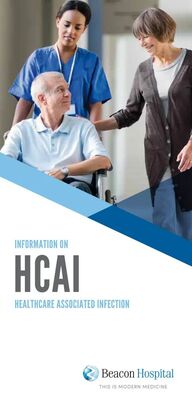
Return to flip book view
What Impact Do HCAIs Have Most common HCAIs only cause a minor illness that is easily treated and does not have any long term effects However some HCAIs can cause serious illness that can lead to a person having to stay in hospital longer and result in long term ill effects Some of the less common types of HCAIs such as pneumonia or blood poisoning can cause very serious illness and unfortunately sometimes death How Are HCAIs Prevented and Controlled About one third of HCAI can be prevented The best way to prevent infection is through good professional practice including hand hygiene and appropriate care when dealing with patients Some patients with HCAI may require isolation i e placing a patient in a single room to keep them from other patients Most hospitals including Beacon Hospital check these infections to make sure that control measures are working and there is ongoing education for doctors nurses and other healthcare professionals Further information Please do not hesitate to ask the healthcare staff caring for you if you have any questions or if you require more information about HCAIs Information on hand hygiene infection control and managing superbugs at home is available on www hse ie infectioncontrol INFORMATION ON HCAI INFECTION PREVENTION CONTROL TEAM HEALTHCARE ASSOCIATED INFECTION Beacon Hospital Sandyford Dublin 18 D18 AK68 This leaflet is adapted from the information leaflet produced by the HSE www hse ie August 2022 Version 2 Tel 01 293 6600 www beaconhospital ie
INFORMATION ON HCAI HEALTHCARE ASSOCIATED INFECTION These treatments may save people s lives but at the same time may leave them more at risk of getting an infection What Is a Healthcare Associated Infection A healthcare associated infection HCAI is an infection that a person gets after being in hospital or after receiving medical treatment HCAIs that are picked up in hospital are also known as hospital acquired infections HCAIs are most Increased patient movement between wards due to pressures on hospital beds More frequent use of antibiotics and the emergence of antibiotic resistant germs Who Is Most at Risk of Developing a HCAI The more medical care a person requires the more likely they are to develop an infection HCAIs are most common in people with serious illnesses or risk factors such as Patients with large wounds following surgery burns or a serious accident Patients who are on a drip intravenous line or other medical device for a long period of time Patients with a weakened immune system such as patients who have been treated for leukaemia or cancer or those who have had a transplant often linked to treatment in hospitals but can happen after treatment in outpatient clinics nursing homes and other healthcare settings Are HCAIs a New Problem No Infections have always been a side effect of medical treatment especially in hospitals HCAIs may have been just as common or even more common in the past but may not have been spotted or reported We are more aware of healthcare associated infections today because we are better able to spot and report these infections now than we were in the past There are reasons why HCAIs are still a problem such as More high risk people are being treated than ever before such as elderly patients or patients with severe or long term diseases Better medical treatments allow us to treat diseases that in the past could not be cured How Common Are HCAIs About one in ten patients who are admitted to hospital develop an infection This figure varies from time to time It can also vary between hospitals and between types of patients For example patients in the Intensive Care Unit ICU are more likely to develop an infection than those in other parts of the hospital because they are usually sicker and have more risk factors Patients who do not have a serious illness and are admitted to hospital for a short time are at low risk of developing a HCAI Types of HCAIs The most common is bladder or kidney infection usually following the insertion of a catheter or a tube to help drain urine Other types of HCAIs include pneumonia which can happen in the Intensive Care Unit where a patient is on a life support machine surgical wound infection which may follow major surgery device related infection which can happen when an intravascular device drip is used and bacteraemia blood poisoning